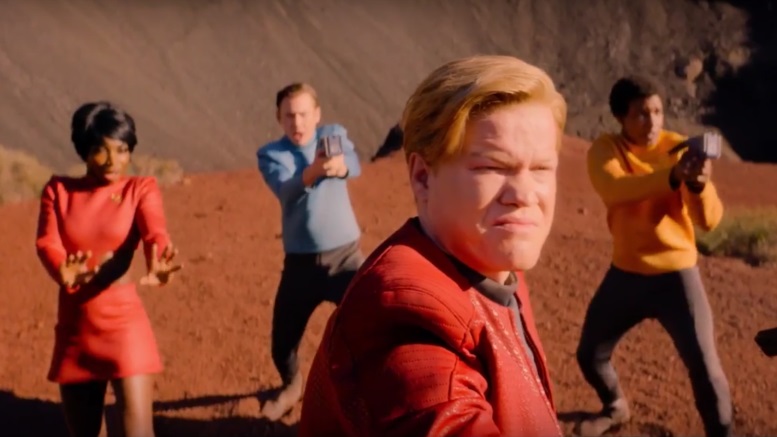Jorge continues to look into the Emmy nominees before the show on September 17th.

WARNING! Spoilers below for the Black Mirror episode "U.S.S. Callister"!
Black Mirror has to operate as an individual, stand-alone story in every episode. As an anthology series, there’s no cast of characters to follow through long arcs, no stories to pick up from, no built-in mythology or tone. In a way, this is incredibly freeing, as they can experiment as much as possible since he only thing that ties the episodes together is a theme. But being basically TV movies (which is what they submit themselves as with the Emmys), they also have to to the groundwork for the audience every time.
And it’s not simple groundwork. Black Mirror revolves around the dangers, consequences, benefits and untapped potential of technology. Elaborate worlds, complex gadgets, and characters living in somewhat alternate universes are built into its fabric. It’s always part of the journey to discover what terrifying side of our screen devices they’ll explore...
For the season four premiere, “U.S.S. Callister,” Let’s see how series creator Charlie Brooker and co-writer William Bridges let the audience discover the alternate technology of the world alongside one of the characters, and how they overturn the perception of everything we’d seen until then.
Black Mirror
“U.S.S. Callister”
Written by: William Bridges and Charlie Brooker
“U.S.S. Callister” starts out as an underdog story. Jesse Plemons stars as Robert Daly, the CFO of a virtual reality video game company, for which he wrote the main code. The episode starts with what we assume is his dream sequence of a Star Trek-like show about a space fleet rescuing the galaxy. But then we see his everyday routine. He is constantly bullied and undermined by his employees, especially by his partner who treats him like a subordinate.
Everything changes with the arrival of Nanette (ray of sunshine Cristin Milioti), the one person that treats him with dignity, respect, and even some reverence. Then things take a turn. Daly steals Nanette’s cup of coffee and inserts it into a home version of the virtual reality game he created. And then Nanette wakes up. But “this isn't her bed. Or her room. [She looks] OUT THE WINDOW - stretching out either side of the window is the UNIVERSE. DEEP SPACE.”
She hears a nearby conversation, and enters a control room. A group of people welcome her. They all look like her co-workers (or alien versions of them). She knows who they are, but they don’t know who she is. They ask her about the outside world. She’s restless and confused. They tell her she’s aboard Robert Daly’s ship. She needs to sit down.

***

***

Many other Black Mirror episodes rely on the audience’s ability to catch up with the world and technology without any overt explanations. But the way Nanette finds out about her situation is very straight-forward. It is literally just the other characters laying it out for her:
She’s trapped in an offline, separate version of Daly’s virtual reality game, one that only he can access. She can’t leave because she’s not herself; she’s a digital copy of herself. Daly brought them all there for different reasons: “I called him out for staring,” “I reset his admin permissions,” “I brought him the wrong sandwich, “insufficient smiling…”They are all there as dolls in Daly’s playground, submitting to his whims, unable to get out.

***

In any other circumstance, this dumping of exposition may appear as too on-the-nose or obvious. It’s better to show than to tell, after all. However, the show is doing a second, arguably more important thing by making the reveal this way. As this is explained, everything that was set up before in the episode is suddenly null. The person we perceived as a protagonist is now a vicious villain. The episode is not about a high-tech genius that’s underappreciated and bullied, but about the toxicity of male geek culture.
Nanette was originally set up as the outsider coming into the world as Daly’s only solace, and potential love interest. Now she’s a textbook lead; the one that needs to be explained the rules of her world, the one that needs to fail miserably in order to take the situation seriously, the one that will make a sacrifice to save the rest of the team. As she is being told that she cannot leave, the episode is making a sharp turn in theme, mood, and kind of point of view. And off we go.

***

Black Mirror is known for balancing and shifting genres, tones, different storylines and kinds of protagonists with their episodes. However, it seldom does it within a single one like it does with “U.S.S. Callister.” It establishes a world and a lead character not once, but twice. It starts out as a hero’s redemption story that turns on its head and becomes about something and someone else. Redemption that becomes obsession. Heroism that becomes entitlement. To a place where no man has gone before.